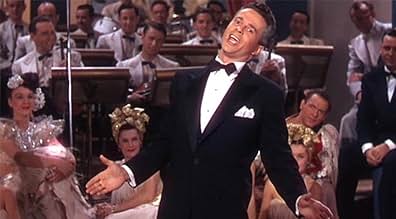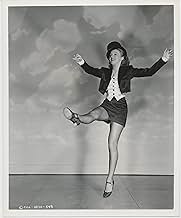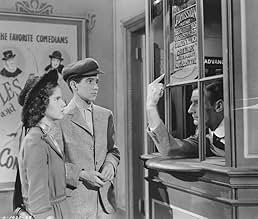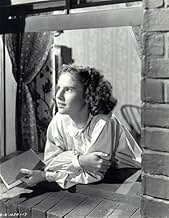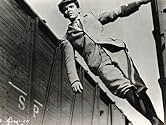IMDb RATING
7.2/10
1.9K
YOUR RATING
This movie shows the idealized career of the singer Al Jolson, a little Jewish boy who goes against the will of his father in order to be in showbiz. He becomes a star, falls in love with a ... Read allThis movie shows the idealized career of the singer Al Jolson, a little Jewish boy who goes against the will of his father in order to be in showbiz. He becomes a star, falls in love with a non-Jewish dancer, and marries her. In the end he chooses success on the stage.This movie shows the idealized career of the singer Al Jolson, a little Jewish boy who goes against the will of his father in order to be in showbiz. He becomes a star, falls in love with a non-Jewish dancer, and marries her. In the end he chooses success on the stage.
- Won 2 Oscars
- 5 wins & 5 nominations total
The Robert Mitchell Boy Choir
- Church Choir
- (as Mitchell 'Boychoir')
John Alban
- Audience Member
- (uncredited)
Rod Alexander
- Dancer
- (uncredited)
Jessie Arnold
- Wardrobe Woman
- (uncredited)
Frank Baker
- Audience Member
- (uncredited)
Steve Benton
- Audience Member
- (uncredited)
Edward Biby
- Audience Member
- (uncredited)
7.21.9K
1
2
3
4
5
6
7
8
9
10
Featured reviews
A musical gem gave new life to Jolson's reputation...
As a previous commentator put it so well, Larry Parks is better at playing Jolson than Jolson is! It's a fact. Watching him perform as Jolson is infinitely more pleasurable than watching the man himself--and if you've seen any of Jolson's own films you'll acknowledge the truth in my statement. Thank God Larry Parks was chosen to play him--his lip synch job is amazing. When those pure rich tones emanate from his mouth the movie goes into high gear. A dazzling number of songs sung in Jolson's inimitable style makes this a real treasure for fans of nostalgia. It's no wonder this was one of the most popular films of 1946. Glossy production values, a great cast, a script that whitewashes the true Jolson character but still has enough bearing on reality to make it an interesting bio. A total pleasure from beginning to end--again, mainly because Larry Parks was at the right place at the right time. Definitely one of the best musical biographies of all time...and fortunately, the sequel is not far behind it. See 'Jolson Sings Again' and you'll see what I mean.
Enjoyable!
I was 20years old when this film came out, and Jolson voice was so well known even before, that it was such a big thrill to see his biography on film. Larry Parks was typecast from the very beginning, playing Al Jolson. He was a fine actor but got involved with communism politics of the McCarthy Hearings and was dropped by the studios in 1950. Evelyn Keyes (of Gone With the Wind fame) plays Mrs Jolson, and William Demarest plays Jolson's mentor. Ludwig Donath plays his father the Cantor while Tamara Shayne plays his mother. His father wanted him to be a cantor, but Jolson wanted to sing on stage, so he runs away at an early age. He takes up with a fidler on the stage played by William Demarest. It is true that Jolson was such an egotist and loved singing so much that it broke up his marriage. Wonderful scoring of the music, and photography is enchanting. If you like the old songs, especially Jolson's, don't miss it! 8/10
10clive-38
The most enthralling musical biography of all time - "you ain't heard nothin' yet!"
"The Jolson Story" must be one of the most outstanding musical biographies to ever come out of Hollywood with a multitude of unforgettable popular songs, luxuriant colour photography, and a noteworthy performance by Larry Parks in his most accomplished role as Al Jolson. The stunning Evelyn Keyes sparkled as Julie Benson and the eminent William Demarest was entertainer Steve Martin (later Jolson's manager). "Give that boy a spotlight!!". Ludwig Donath and Tamara Shayne were an inspired choice as Jolson's parents: "Papa, Asa isn't Asa any more!". Bill Goodwin was Jolson's close friend and singer Tom Baron (later theatrical impresario) and talented Scotty Beckett gave an appealing performance playing Jolson as a boy. William Demarest had also appeared with Al Jolson years earlier in "The Jazz Singer" (1927) so it is intriguing to speculate whether they reminisced about that during the production of "The Jolson Story". William Demarest received an Academy Award nomination as Best Supporting Actor for his part in "The Jolson Story" but was beaten by Harold Russell for "The Best Years of Our Lives". Larry Parks was also nominated (as Best Actor) but lost to Fredric March (again for "The Best Years of Our Lives"). As some small consolation the film did win Oscars for the Best Musical Score and the Best Sound Recording. (For some obscure reason it wasn't even nominated for the best picture award much to my surprise).
The film has an absorbing storyline even though it is not entirely accurate and it does take some liberties with the facts. Jolson's mother died when he was eight years old yet in the film she lives on to see him become a big success on Broadway. Many people who played active parts in Jolson's real life story did not even get a mention in the film version. His long time manager Louis Epstein, his dresser/valet Frank Holmes and his brother Harry were all eliminated from the plot! The character Steve Martin played by William Demarest did not actually exist and it has been suggested that this role was probably a composite of the three men referred to above plus several other people. Jolson's first two wives were not even mentioned and Ruby Keeler (Jolson's third wife) would not allow her name to be used in the picture so ravishing Evelyn Keyes had to play the fictitious Julie Benson instead. Ziegfeld: "This is Julie Benson - the star of my next production "Show Girl"." Jolson: "Mr Ziegfeld you will please not advertise on my time!".
Harry Cohn (the notorious head of Columbia Pictures) is to be congratulated for going ahead with this film when all the other major studios had turned it down. Even Warner Bros. (for whom Jolson had starred in several films) were not interested. Filming was started on a small budget and in black and white. However, when Harry Cohn saw the early rushes he decided to film in colour and make "The Jolson Story" a major prestigious production. This certainly paid off for him in a big way as the film became one of Columbia Pictures top money earners. Jolson desperately wanted to play the leading role himself and was opposed to another actor portraying his life. Unfortunately at that stage in his career he was obviously too old (he was 60) but the studio could not have found anyone better than the young Larry Parks (31) who perfectly captured the Jolson style and threw himself into the part with relish. However, Jolson did manage to play himself in one scene singing "Swanee" on the Winter Garden runway (all filmed in longshot with no close-ups). When I saw "The Jolson Story" for the first time it had a major impact on my life and for weeks afterwards I was quoting lines from the film that had stuck in my mind such as these from Jolson to Julie Benson: "Broadway, ha, what a street, you know something baby - it belongs to me. You know something else, if you want it, I'll give it to you!"
The musical numbers were absolutely magnificent and with popular songs like "California Here I Come", "You Made Me Love You", "Toot Toot Tootsie", "April Showers", "Robert E. Lee", "Liza", "Mammy", "Liza", "About a Quarter to Nine", "I'm Sitting on Top of the World" and "Rockabye Your Baby" how could it miss! If there is one film I could take to a desert island it would have to be "The Jolson Story" as I never tire of seeing repeated showings of this timeless classic. As Jolson himself would have said: "Settle back folks, you ain't heard nothin' yet!" (and he would be right about that). 10/10. Clive Roberts.
The film has an absorbing storyline even though it is not entirely accurate and it does take some liberties with the facts. Jolson's mother died when he was eight years old yet in the film she lives on to see him become a big success on Broadway. Many people who played active parts in Jolson's real life story did not even get a mention in the film version. His long time manager Louis Epstein, his dresser/valet Frank Holmes and his brother Harry were all eliminated from the plot! The character Steve Martin played by William Demarest did not actually exist and it has been suggested that this role was probably a composite of the three men referred to above plus several other people. Jolson's first two wives were not even mentioned and Ruby Keeler (Jolson's third wife) would not allow her name to be used in the picture so ravishing Evelyn Keyes had to play the fictitious Julie Benson instead. Ziegfeld: "This is Julie Benson - the star of my next production "Show Girl"." Jolson: "Mr Ziegfeld you will please not advertise on my time!".
Harry Cohn (the notorious head of Columbia Pictures) is to be congratulated for going ahead with this film when all the other major studios had turned it down. Even Warner Bros. (for whom Jolson had starred in several films) were not interested. Filming was started on a small budget and in black and white. However, when Harry Cohn saw the early rushes he decided to film in colour and make "The Jolson Story" a major prestigious production. This certainly paid off for him in a big way as the film became one of Columbia Pictures top money earners. Jolson desperately wanted to play the leading role himself and was opposed to another actor portraying his life. Unfortunately at that stage in his career he was obviously too old (he was 60) but the studio could not have found anyone better than the young Larry Parks (31) who perfectly captured the Jolson style and threw himself into the part with relish. However, Jolson did manage to play himself in one scene singing "Swanee" on the Winter Garden runway (all filmed in longshot with no close-ups). When I saw "The Jolson Story" for the first time it had a major impact on my life and for weeks afterwards I was quoting lines from the film that had stuck in my mind such as these from Jolson to Julie Benson: "Broadway, ha, what a street, you know something baby - it belongs to me. You know something else, if you want it, I'll give it to you!"
The musical numbers were absolutely magnificent and with popular songs like "California Here I Come", "You Made Me Love You", "Toot Toot Tootsie", "April Showers", "Robert E. Lee", "Liza", "Mammy", "Liza", "About a Quarter to Nine", "I'm Sitting on Top of the World" and "Rockabye Your Baby" how could it miss! If there is one film I could take to a desert island it would have to be "The Jolson Story" as I never tire of seeing repeated showings of this timeless classic. As Jolson himself would have said: "Settle back folks, you ain't heard nothin' yet!" (and he would be right about that). 10/10. Clive Roberts.
THE Magical Musical of All-Time.
After all these years, and all my countless viewings, "The Jolson Story" remains the most magical and thrilling of all Hollywood musical biographies. It also stands as testament to "The World's Greatest Entertainer," Al Jolson, and his tremendous impact on show business for all time. Jolie's fantastic voice, filled with warmth, power and soul, will always be heard as long as this wonderful movie is viewed. Larry Parks and his supporting cast are superb, but it is that Jolson voice, electricity-personified, that elevates the film to immortal status.
They Don't Get Any Better Than This
I could sit and listen to Jolson music endlessly. First of all,he had to be the originator of soul music, sung right from the heart. We heard what he felt and then felt what he felt. Secondly,he was the only singer I ever heard whose voice sounded like a trumpet. Perfect pitch, clear,crisp and resounding. Hence, we put together those two attributes, add his showmanship, charm and charisma and we end up with the greatest single entertainer in the history of American show business. Larry Parks is truly astounding and gives a performance, including perfect lip synching, that should have earned him the Oscar. Politics came first, apparently.
The film, even with its occasional flaws, was amazingly entertaining. From the first scene to when his Julie Benson walks out by realizing that she could have never taken the music out of Jolson and vice versa,the entire production was pure hypnotic joy. Unbeatable music, warmth, tenderness and humility run wild. A superb feast for the ears and eyes. A never-to-be-forgotten film.
The film, even with its occasional flaws, was amazingly entertaining. From the first scene to when his Julie Benson walks out by realizing that she could have never taken the music out of Jolson and vice versa,the entire production was pure hypnotic joy. Unbeatable music, warmth, tenderness and humility run wild. A superb feast for the ears and eyes. A never-to-be-forgotten film.
Did you know
- GoofsThe Jazz Singer (1927) had its world premiere at the Warner Theatre in New York, not the Winter Garden as depicted in the film (as "The Jolson Story" was a Columbia picture, the change is understandable).
- ConnectionsFeatured in The Soundman (1950)
- SoundtracksLet Me Sing and I'm Happy
(uncredited)
Written by Irving Berlin
Sung by Al Jolson over opening credits
Originally from Mammy (1930)
- How long is The Jolson Story?Powered by Alexa
Details
- Release date
- Country of origin
- Language
- Also known as
- Der Jazzsänger
- Production company
- See more company credits at IMDbPro
Box office
- Budget
- $2,800,000 (estimated)
- Runtime
- 2h 8m(128 min)
- Aspect ratio
- 1.37 : 1
Contribute to this page
Suggest an edit or add missing content

